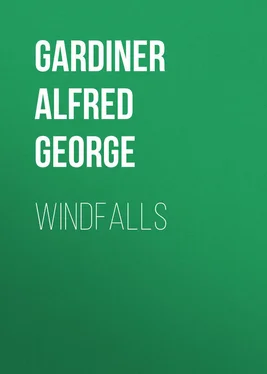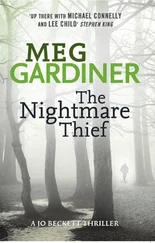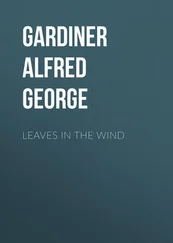Alfred Gardiner - Windfalls
Здесь есть возможность читать онлайн «Alfred Gardiner - Windfalls» — ознакомительный отрывок электронной книги совершенно бесплатно, а после прочтения отрывка купить полную версию. В некоторых случаях можно слушать аудио, скачать через торрент в формате fb2 и присутствует краткое содержание. Жанр: foreign_antique, foreign_prose, на английском языке. Описание произведения, (предисловие) а так же отзывы посетителей доступны на портале библиотеки ЛибКат.
- Название:Windfalls
- Автор:
- Жанр:
- Год:неизвестен
- ISBN:нет данных
- Рейтинг книги:3 / 5. Голосов: 1
-
Избранное:Добавить в избранное
- Отзывы:
-
Ваша оценка:
- 60
- 1
- 2
- 3
- 4
- 5
Windfalls: краткое содержание, описание и аннотация
Предлагаем к чтению аннотацию, описание, краткое содержание или предисловие (зависит от того, что написал сам автор книги «Windfalls»). Если вы не нашли необходимую информацию о книге — напишите в комментариях, мы постараемся отыскать её.
Windfalls — читать онлайн ознакомительный отрывок
Ниже представлен текст книги, разбитый по страницам. Система сохранения места последней прочитанной страницы, позволяет с удобством читать онлайн бесплатно книгу «Windfalls», без необходимости каждый раз заново искать на чём Вы остановились. Поставьте закладку, и сможете в любой момент перейти на страницу, на которой закончили чтение.
Интервал:
Закладка:
This is not a plea for untidiness. I am no hot gospeller of disorder. I only seek to make the best, of a bad job, and to show that we untidy fellows are not without a case, have our romantic compensations, moments of giddy exaltation unknown to those who are endowed with the pedestrian and profitable virtue of tidiness. That is all. I would have the pedestrian virtue if I could. In other days, before I had given up hope of reforming myself, and when I used to make good resolutions as piously as my neighbours, I had many a spasm of tidiness. I looked with envy on my friend Higginson, who was a miracle of order, could put his hand on anything he wanted in the dark, kept his documents and his files and records like regiments of soldiers obedient to call, knew what he had written on 4th March 1894, and what he had said on 10th January 1901, and had a desk that simply perspired with tidiness. And in a spirit of emulation I bought a roll-top desk. I believed that tidiness was a purchasable commodity. You went to a furniture dealer and bought a large roll-top desk, and when it came home the genius of order came home with it. The bigger the desk, the more intricate its devices, the larger was the measure of order bestowed on you. My desk was of the first magnitude. It had an inconceivable wealth of drawers and pigeon-holes. It was a desk of many mansions. And I labelled them all, and gave them all separate jobs to perform.
And then I sat back and looked the future boldly in the face. Now, said I, the victory is won. Chaos and old night are banished. Order reigns in Warsaw. I have but to open a drawer and every secret I seek will leap magically to light. My articles will write themselves, for every reference will come to my call, obedient as Ariel to the bidding of Prospero.
“Approach, my Ariel; come,”
I shall say, and from some remote fastness the obedient spirit will appear with —
“All hail, great master; grave sir, hail! I come
To answer thy best pleasure; be ‘t to fly,
To swim, to dive into the sea, to ride
On the curl’d clouds.”
I shall know where Aunt Jane’s letters are, and where my bills are, and my cuttings about this, that, and the other, and my diaries and notebooks, and the time-table and the street guide. I shall never be short of a match or a spare pair of spectacles, or a pencil, or – in short, life will henceforth be an easy amble to old age. For a week it worked like a charm. Then the demon of disorder took possession of the beast. It devoured everything and yielded up nothing. Into its soundless deeps my merchandise sank to oblivion. And I seemed to sink with it. It was not a desk, but a tomb. One day I got a man to take it away to a second-hand shop.
Since then I have given up being tidy. I have realised that the quality of order is not purchasable at furniture shops, is not a quality of external things, but an indwelling spirit, a frame of mind, a habit that perhaps may be acquired but cannot be bought.
I have a smaller desk with fewer drawers, all of them nicely choked up with the litter of the past. Once a year I have a gaol delivery of the incarcerated. The ghosts come out into the daylight, and I face them unflinching and unafraid. They file past, pointing minatory fingers at me as they go into the waste-paper basket. They file past now. But I do not care a dump; for to-morrow I shall seek fresh woods and pastures new. To-morrow the ghosts of that old untidy desk will have no terrors for my emancipated spirit.
AN EPISODE
We were talking of the distinction between madness and sanity when one of the company said that we were all potential madmen, just as every gambler was a potential suicide, or just as every hero was a potential coward.
“I mean,” he said, “that the difference between the sane and the insane is not that the sane man never has mad thoughts. He has, but he recognises them as mad, and keeps his hand on the rein of action. He thinks them, and dismisses them. It is so with the saint and the sinner. The saint is not exempt from evil thoughts, but he knows they are evil, is master of himself, and puts them away.
“I speak with experience,” he went on, “for the potential madman in me once nearly got the upper hand. I won, but it was a near thing, and if I had gone down in that struggle I should have been branded for all time as a criminal lunatic, and very properly put away in some place of safety. Yet I suppose no one ever suspected me of lunacy.”
“Tell us about it,” we said in chorus.
“It was one evening in New York,” he said. “I had had a very exhausting time, and was no doubt mentally tired. I had taken tea with two friends at the Belmont Hotel, and as we found we were all disengaged that evening we agreed to spend it together at the Hippodrome, where a revue, winding up with a great spectacle that had thrilled New York, was being presented. When we went to the box office we found that we could not get three seats together, so we separated, my friends going to the floor of the house and I to the dress circle.
“If you are familiar with the place you will know its enormous dimensions and the vastness of the stage. When I took my seat next but one to one of the gangways the house was crowded and the performance had begun. It was trivial and ordinary enough, but it kept me amused, and between the acts I went out to see the New Yorkers taking ‘soft’ drinks in the promenades. I did not join them in that mild indulgence, nor did I speak to anyone.
“After the interval before the concluding spectacle I did not return to my seat until the curtain was up. The transformation hit me like a blow. The huge stage had been converted into a lake, and behind the lake through filmy draperies there was the suggestion of a world in flames. I passed to my seat and sat down. I turned from the blinding glow of the conflagration in front and cast my eye over the sea of faces that filled the great theatre from floor to ceiling. ‘Heavens! if there were a fire in this place,’ I thought. At that thought the word ‘Fire’ blazed in my brain like a furnace. ‘What if some madman cried Fire?’ flashed through my mind, and then ‘ What if I cried Fire? ’
“At that hideous suggestion, the demon word that suffused my brain leapt like a shrieking maniac within me and screamed and fought for utterance. I felt it boiling in my throat, I felt it on my tongue. I felt myself to be two persons engaged in a deadly grapple – a sane person struggling to keep his feet against the mad rush of an insane monster. I clenched my teeth. So long as I kept my teeth tight – tight – tight the raging madman would fling himself at the bars in vain. But could I keep up the struggle till he fell exhausted? I gripped the arms of my seat. I felt beads of perspiration breaking out on my right brow. How singular that in moments of strain the moisture always broke out at that spot. I could notice these things with a curious sense of detachment as if there were a third person within me watching the frenzied conflict. And still that titanic impulse lay on my tongue and hammered madly at my clenched teeth. Should I go out? That would look odd, and be an ignominious surrender. I must fight this folly down honestly and not run away from it. If I had a book I would try to read. If I had a friend beside me I would talk. But both these expedients were denied me. Should I turn to my unknown neighbour and break the spell with an inconsequent remark or a request for his programme? I looked at him out of the tail of my eye. He was a youngish man, in evening dress, and sitting alone as I was. But his eyes were fixed intently on the stage. He was obviously gripped by the spectacle. Had I spoken to him earlier in the evening the course would have been simple; but to break the ice in the midst of this tense silence was impossible. Moreover, I had a programme on my knees and what was there to say?..
Читать дальшеИнтервал:
Закладка:
Похожие книги на «Windfalls»
Представляем Вашему вниманию похожие книги на «Windfalls» списком для выбора. Мы отобрали схожую по названию и смыслу литературу в надежде предоставить читателям больше вариантов отыскать новые, интересные, ещё непрочитанные произведения.
Обсуждение, отзывы о книге «Windfalls» и просто собственные мнения читателей. Оставьте ваши комментарии, напишите, что Вы думаете о произведении, его смысле или главных героях. Укажите что конкретно понравилось, а что нет, и почему Вы так считаете.












